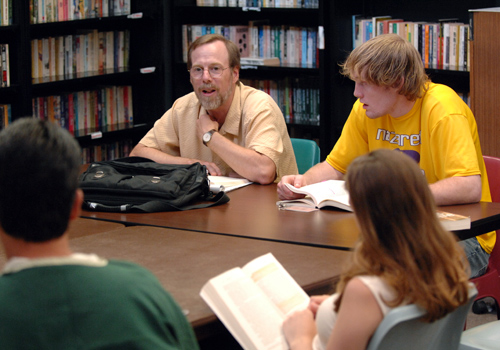Free Your Mind: The Jail Project
While sitting through a challenging college course may feel like you're "doing time," participating in Professor Ed Wiltse's Jail Project actually invites students to spend some time at the Monroe Correctional Facility (MCF). The Jail Project is an optional service-learning component of Wiltse's Crime and Punishment in the USA course, one that fosters a unique understanding of both the academic material at hand as well as a new look at an important cultural issue.
Back in 2001, after a few years of teaching a class on Crime and Detective Fiction, the professor of English and communication wondered if he was potentially encouraging his students to believe the story ends with incarceration. "The nightly newscast and every episode of CSI end with the slamming of the cell door as the solution to the problem, and clearly for the 2.4 million Americans behind bars, it's not the solution to anything," said Wiltse. "It's actually just the middle or the beginning of the story."
That's when Wiltse retitled the course Crime and Punishment in the USA and conceived the Jail Project. The project asks students to attend a series of six one-hour meetings with people being held at the facility, write a journal, present their experiences to the class, and complete an activity that promotes awareness within the college community. Inside the jail, Nazareth students and Monroe Correctional Facility students meet around tables in a classroom. Nazareth's Center for Service Learning sponsors the Jail Project and covers the cost of the MCF students' books.
Often, students experience an enthusiasm from the people in incarceration they never expected. After a few meetings, there's also a new level of understanding and mutual respect.
"A lot of people in our group had the pre-conceived notion of what jail would be like — a violent place full of murderers…" said Shawn Quinn, who participated in the Jail Project as a first-year student at Nazareth. "It was not like that at all. (The people in incarceration) were just like someone you would know, someone you'd feel comfortable with. My opinion definitely changed."
There is an irony that doesn't escape Wiltse or his students at the beginning of each semester. "The incarcerated people are judged by society to be least functional, yet they're volunteering to read a stack of books and gather in a room and talk about them. I ask my class, 'Would you really do it unless you were required to?' Students suddenly realize that something they take completely for granted is extremely valuable."
The Jail Project has evolved over the years, engaging additional faculty and jail partners, including an online collaboration with a Colorado prison and credit-bearing Nazareth courses, sometimes enrolling both incarcerated and campus-based students, taught inside local NYS prisons.
As of 2025, the project has involved more than 700 incarcerated students and 420 Nazareth students, learning about literature and life.
In the Media
Honored: Wiltse is honored with an international award for justice-oriented experiential education (2025).
Radio interview: Wiltse describes people's right to education and the economic benefits of educating prisoners during their time in prison. Listen to his WXXI radio interview.
Democrat and Chronicle story: Inmates in Nazareth's long-standing program express deep appreciation for the experience. One wrote in her journal: "Other inmates and I have talked for hours after you left about the profound difference your class has made in our lives."

Resources
Reading List
- Douglas Greene (ed.), Classic Mystery Stories
- Arthur Conan Doyle, Six Great Sherlock Holmes Stories
- Dashiell Hammett, The Maltese Falcon
- Chester Himes, The Real Cool Killers
- Denise Mina, Garnethill
- Bell Gale Chevigny (ed.), Doing Time: 25 Years of Prison Writing
- Jarvis Masters, Finding Freedom: Writings from Death Row